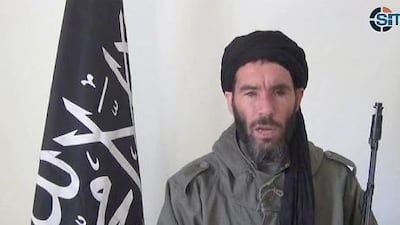BAMAKO // Dozens of hostages held by Al Qaeda-linked militants at a desert gas plant were believed killed yesterday in a botched rescue attempt by Algerian forces.
The Islamist gang, believed to be led by the prominent jihadist Moktar Belmoktar, a former leader of Al Qaeda in the Islamic Maghreb, was quoted by the ANI news agency as saying that 35 out of 41 hostages died in air strikes and ground assaults.
The fatalities have not been independently verified.
Nearly 600 Algerian workers and five foreign hostages – two from Scotland and one each from Ireland, France and Kenya – were understood to have been freed.
“An important number of hostages were freed and an important number of terrorists were neutralised,” said Algeria’s communications minister Mohammed Said.
The military action was continuing last night, amid consternation in Algeria’s neighbouring countries and farther afield.
Shinzo Abe, prime minister of Japan, from where one of the hostages comes, called his Algerian counterpart to urge that troops be pulled out. “He expressed his strong concern that such an operation is under way,” a Japanese government spokesman said.
The hostages were seized in a dawn raid on Wednesday in retaliation for Algerian logistical support for French intervention in the conflict in Mali, with which Algeria shares a 2,000-kilometre border.
There was another day of fierce fighting in Mali yesterday. French and Malian forces were battling Islamist insurgents in two towns, and more troops were on their way to reinforce a third town.
The militants’ attack on the gas plant “will confirm many of Algeria’s fears regarding resurgent Islamist militancy as a consequence of enhanced regional insecurity, particularly in Mali”, said the regional expert Richard Cochrane, of the IHS Jane’s security analysis group.
View Algeria hostage crisis in a larger map
Although Al Qaeda’s regional affiliate is dominated by Algerian fighters and already holds a number of French hostages, “this attack is the most dramatic hostage or kidnapping crisis to have taken place inside Algeria in recent memory”, Mr Cochrane said.
In Tunisia, senior political figures were meeting to discuss the security situation, amid rumours that some of the militants had fled into Algeria’s relatively calm neighbour, and Libyan media reported that security at oilfields was being reviewed.
In Mali, French and Malian ground troops have been battling fiercely to retake territory from a mix of Islamist groups. The small town of Diabaly, while strategically not crucial, is the territory closest to the capital held by fighters from Al Qaeda in the Islamic Maghreb, Ansar Edine and the Movement for Unity and Jihad in West Africa.
Malian soldiers said the town more than 300km north-east of Bamako was surrounded by French and Malian forces, but that they had not yet taken it.
In the more strategically important area around Konna, a middle-ranking Malian officer said there had been fierce fighting and significant gain. France’s decision to launch air strikes a week ago came when Islamist fighters, who had controlled the northern expanse of Mali for more than seven months, pushed south into Konna.
Retaking the city is seen as crucial and has thus far been elusive, but on Wednesday French soldiers with their Malian counterparts fought fiercely with a mix of Islamist groups, killing dozens of about 200 opponents who staged ambushes as the French and Malians tried to push forward. Some Malian soldiers were slightly wounded, and there were no French casualties.
The fighters were using anti-aircraft weapons mounted on the back of Toyota pickup lorries, the officer said, and left six behind when they fled. Such weapons were ubiquitous during the 2011 conflict in Libya, from where huge numbers of weapons are believed to have been smuggled to Mali.
French aircraft flew in and bombarded the rebel forces during the battle, which lasted more than 12 hours. The officer said sources in Konna had seen Islamist fighters still present in the city, load the bodies of their fallen comrades into a pickup and head north. Yesterday, the column was on the road to Konna, facing no resistance.
Malian soldiers were also reported to have headed to the town of Banama, close to the western border with Mauritania, after Islamist militants were spotted in the region. International assistance, promised by a number of West African countries, had still not arrived in the country yesterday, although the European Union announced a training mission after a meeting in Brussels.
afordham@thenational.ae
* Additional reporting by Reuters and Agence France-Presse

